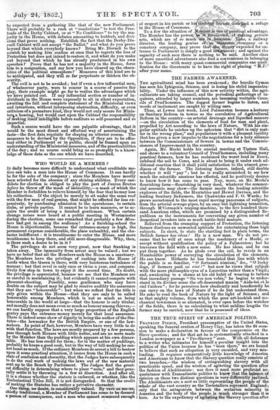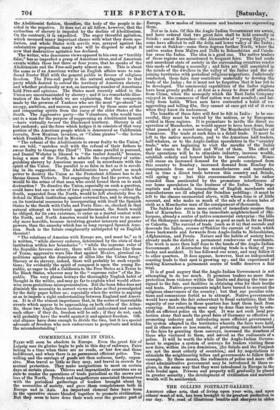THE TRUE SPIRIT OF AMERICAN POLITICS.
FRANKLIN PIERCE, President presumptive of the United States, speaking the funeral oration of Henry Clay, has taken the fit occa- sion to make a declaration in favour of the compromise on the Slave question ; and for that act he is systematically attacked in a London newspaper as a " Pro-Slavery " man. With all deference to a writer who intimates for himself a peculiar insight into the politics of the Union because he has "been there," we are bound to believe that such an allegation is very onesided, and very mis- leading. It requires comparatively little knowledge of America and Americans to know that the Slavery question really consists of two branches,—the wisdom of extinguishing slavery with all practicable speed, and the wisdom of agitating the question after the fashion of Abolitionists nor does it need more profcuxul ac- quaintance with Transatlantic politics to know that the balance of opinion on these two distinct questions is very differently inclined.. The Abolitionists are a sect as little representing the people of the whole of the vast country as the Teetotallers represent England ; only that the antagonism between the sectarian minority in America and the body of the people is muck stronger than it is here. As to the expediency of agitating the Slavery question after
the Abolitionist fashion, therefore, the body of the people is de- cided in the negative. It does not at all follow, however, that the extinction of slavery is impeded by the decline of Abolitionism. On the contrary, it is expedited. the angry threatful agitation, which menaced many important classes with what they deem spo- liation, and whole States with servile war, arrayed against the substantive proposition many who will be disposed to adopt it now that destructive agitation has declined.
The writer, who denounces views opposed to his own as " terribly _Abe," has so imperfect a grasp of American ideas, and of American events within these last three or four years, that he speaks of the Abolitionists and the Free-soil party almost as one. This is about the same as if an American writer on English affairs were to .con- found Exeter Hall with the general public in favour of religious freedom. The Free-soil party is the natural antagonist to that party WhiCh desired to extend the territory of American slavery; and whether professedly or not, an increasing number of Americans hold Free-soil opinions. The States most recently added to. the Union are uncontaminated by slavery ; and it is a remarkable illus- tration of the facts which we are explaining, that the conquests made by the prowess of .Yankees who are the most " go-ahead" in energy, ambition, and success, are preserved by those same ardent and conquering spirits from the curse of the older States of the South. The Aggressive party—the Volunteers, who would turn out to a man for the purpose of suppressing an Abolitionist tumult —haie virtually turned the Blackened territory. Slavery is all but enclosed ; and the force which hedges it in consists of that very portion of the American people which is denounced as Californian recruits, New Mexican invaders, or " Cuban pirates "—the levies which Franklin Pierce Ied in Mexico.
" The refusal of the Abolitionists to swear fealty to the Union," we are told, "matches well with the refusal of their fathers to swear fealty to George the Third" ! The same parallel is pursued, and Daniel 'Webster is likened to "the traitor Arnold," because, being a man of the North, he admits the expediency of extin- guishing slavery by American means and in accordance with the spirit of the Union. The parallel is as false in fact as it is revolt- ing in its suggestion. The Abolitionists have about as much power to destroy the Union as the Protestant Alliance has to de- throne Queen Victoria. But supposing they had the power, what would be the crime of that man.who could hound them on to such destruction ? To dissolve the Union, especially on such a question, could have but one or other of two great oonsequences,—either the South, separated from the North, would be left absolutely free to defend its Black institution against external foes, and to strength- en its territorial resources by incorporating with itself the Spanish States to the South with Cuba and Porto Rico ; or, checked in that natural attempt at territorial aggrandizement, the South would be obliged, for its own existence, to enter on a mortal contest with the North, and North America would be handed over to an anar- chy more horrible, because involving greater interests and greater powers, than the anarchy which has so long ravaged Spanish Ame- rica. Inch is the future complacently anticipated by an English theorist!
" The relations of America with Europe are, and must be," so it is written, " while slavery endures, determined by the state of that institution within her boundaries" : "while the supreme ruler of the Republic favours slavery, there will be annexations like those of Texas, aggressive wars like that against Mexico, piratical ex- peditions against the dominions of allies like the Cuban foray." Slavery or no slavery, indeed, there will probably be . such expedi- tions; for evidently the spirit of conquest is upon the young Re- public, as eager to add a California to the Free States as a Texas to the Black States, whoever may be the " supreme ruler" of the Re- public. The very phrase betrays the thoroughly English habit of thought in the writer, and may go far to explain what would other- wise seem gratuitous misrepresentation. But the bona fides does not diminish the necessity to correct views so false as that promulgated by the daily paper before us; especially when the writer is arguing so as to impede a right understanding between England and Ameri- ca. It is of the utmost importance that, in the series of inscrutable events which appear to be approaching on both sides of the Atlan- tic, those two Anglo-Saxon nations should understand and sustain each other : if they do, freedom will be safe ; if they do not, each will probably have the world against it and against freedom. Offi- cial cliques have done enough to divide the two, but it is a special advocate of freedom who now endeavours to perpetuate and widen the misunderstanding!



























 Previous page
Previous page